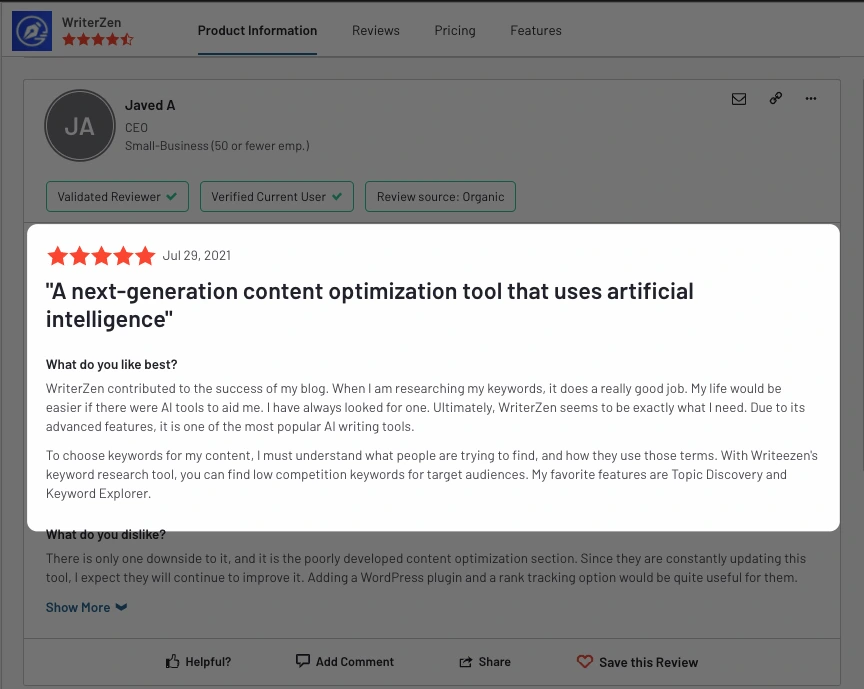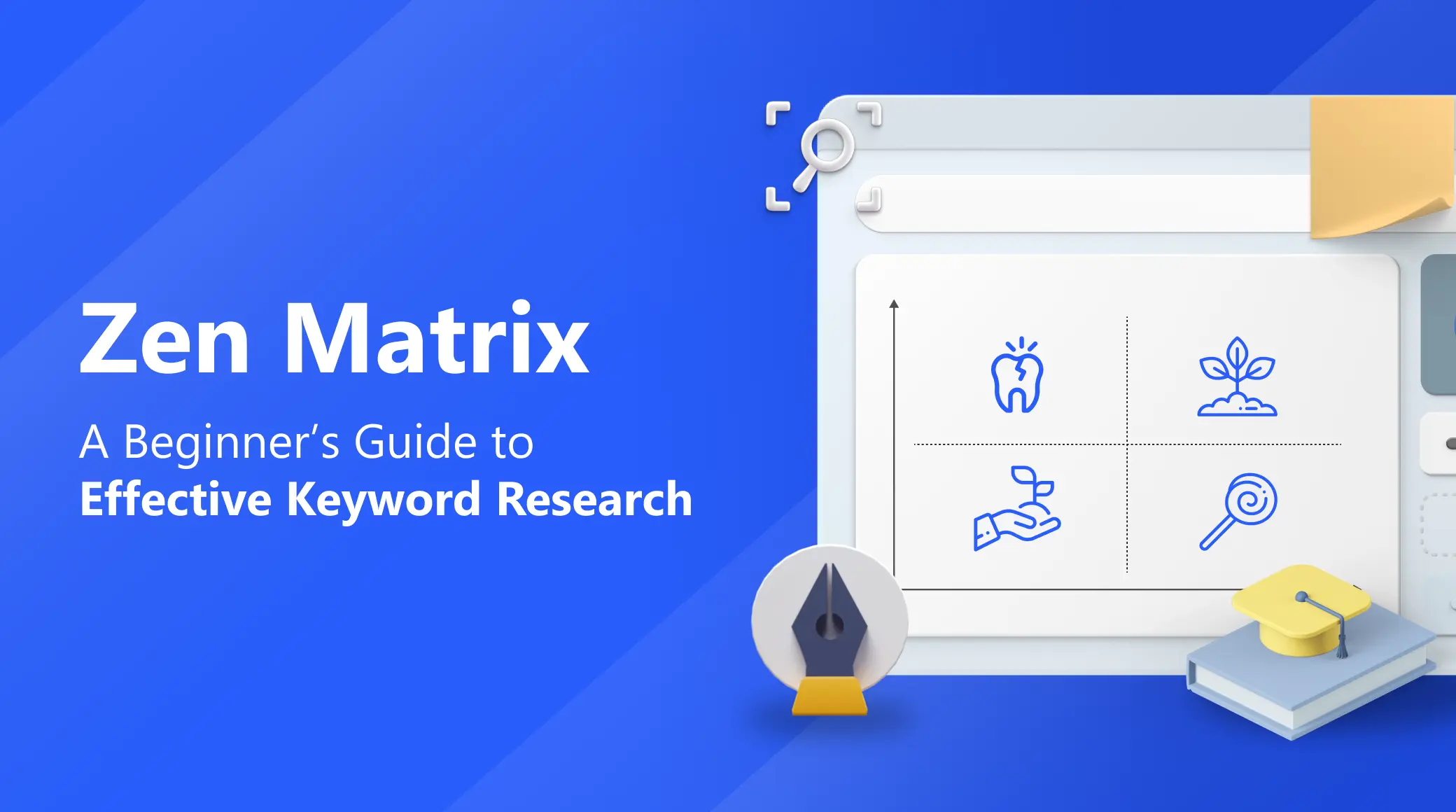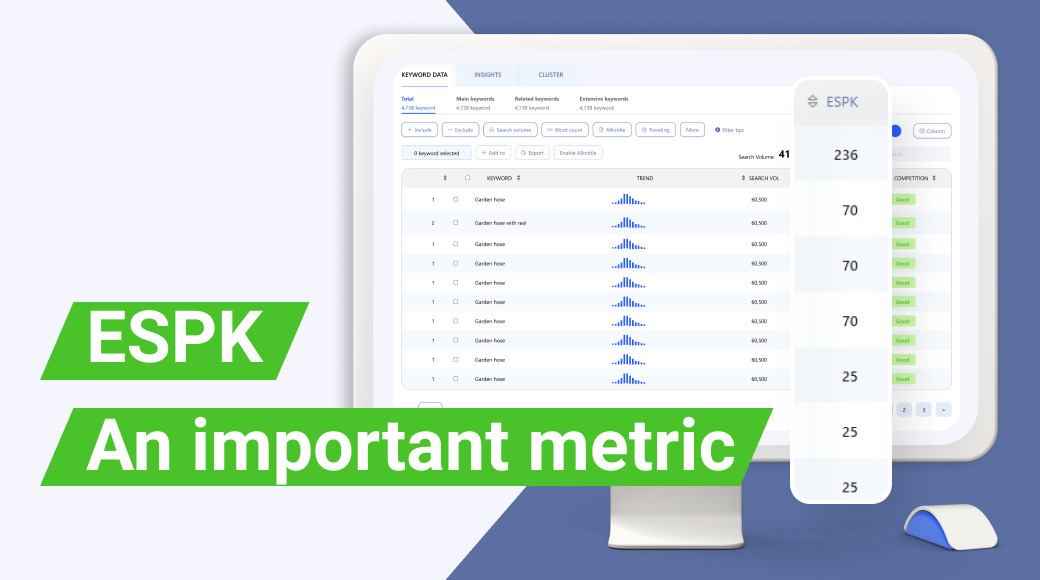Angela closed the tab.
Another “valuable” blog post, but it couldn’t solve her problem.
She switched to the Google spreadsheet opened in another tab and reread her editor’s comment:
“Your keyword data are inaccurate. They don’t fit into our SEO campaign. Most of them are not something we can target at this stage. Rethink this entire keyword strategy, Angela. We don’t want our clients perceiving us as impostors.”
She felt the urge to reply to his comment, telling him how she’d used different tools to find and categorize those keywords. He couldn’t just ask her to rethink everything after all her efforts.
But as Angela’s fingers began to dance on the keyboard, reality set in.
She never understood the data her keyword research workflow produced.
Sometimes, they seemed like a pile of debris waiting for her to sort out. And so, she categorized them blindly without knowing which suited their client’s SEO campaign.
She couldn’t tell her boss that. Such a confession would cost her job. So, she waved off the thought and opened another tab.
Angela had another query for Google:
How Do You Categorize Keywords for SEO Campaign?
If you’re a content manager like Angela, I bet you’ve asked yourself that question several times.
For one, the tools at your disposal aren’t always accurate. To be on the safe side, you must ensure the data your tool fetches comes from Google. But even if they pull their data from Google Keyword Planner (GKP), you can’t be so sure of its accuracy.
Why?
According to Ahrefs, GKP overestimates search volume 54.28% of the time.
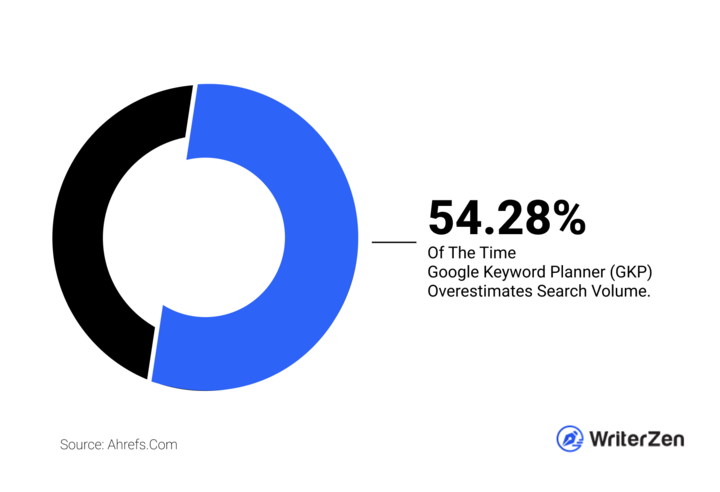
In the words of Stoney Degeyter, Director of Digital Marketing at Socket Mobile:
“The biggest problem with keyword research tools is that the data is wrong. There is just no other way to say it. Now, they may vary in degrees of accuracy, but that’s just another way to say they vary in degrees of inaccuracy! It’s really not how right they are, but about how wrong they are.”
What’s worse?
These tools may gush search volume, SERPs, backlink profiles, and other relevant data. But they don’t categorize your keywords, letting you know which to prioritize and which to ignore.
Well, that’s not enough excuse to organize your keyword haphazardly.
Your clients see you as an expert and expect the best from you. Even your employer wouldn’t hire you if they perceived you as a wannabe.
So back to our question: What’s a better way to organize your keywords?
Experts like Ann Smarty, Founder of ViralContentBee, recommend you categorize keywords based on usefulness, relevancy, search intent, and brand-focused queries.
And that’s a great option.
But when you're drowning in an ocean of overwhelming SEO information like Angela, this may be tedious. Moreso, it’s hard to know which would rank faster in the shortest time.
Our team at WriterZen understands this.
It’s why we came up with an easier way to categorize keywords:
Zen Matrix is a simplified method of finding and categorizing the right keywords that fit into different stages of your SEO campaign.
It’ll help you find ideal long-tail keywords for crafting high-quality content that ranks faster.
Sharon B. switched from Postspace and Outranking to WriterZen because of this.
Here’s what she said after making the switch:
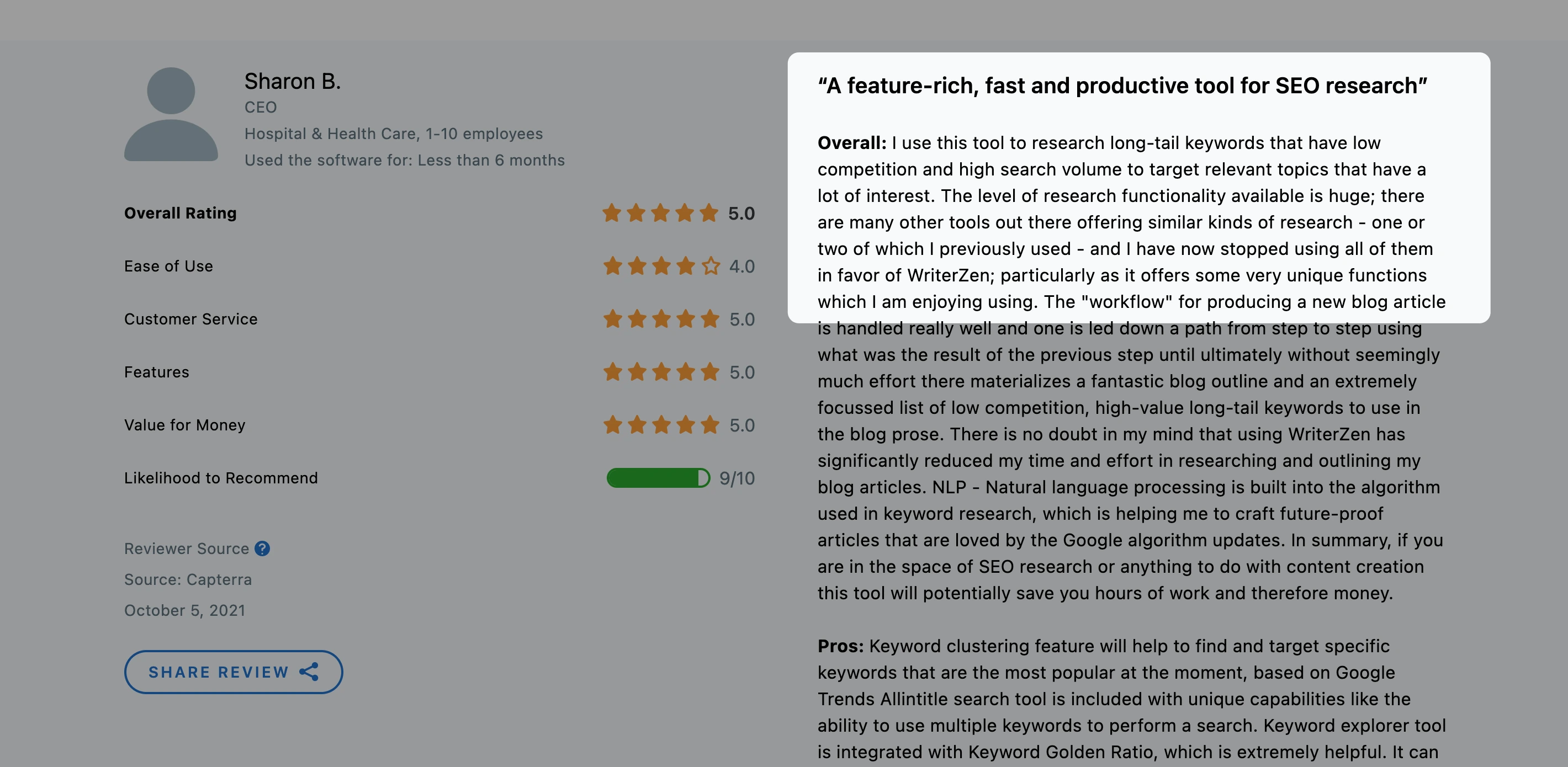
WriterZen review on Capterra
If you’re patient enough to digest this piece to the end, you too, like Sharon, will find low-competition keywords that fit into your content marketing SEO strategy.
But if you can’t wait…
Introducing Zen Matrix: A Better Way to Research & Categorize Keywords
Ranking high on SERPs has gone beyond targeting high-volume, long-tail keywords and retiring to your bed.
According to Chamal Rathnayaka, Founder of Pitiya:
“SEO keywords research has become so competitive that over time long-tail keywords have got higher competition.”
And as Daniel Lofaso, Founder of Digital Elevator, suggested:
“Instead of targeting keywords or topics that have high volume, we need to target keywords and topics that we actually have a chance to rank for, making the best use of our time and SEO efforts.”
Here’s what these experts are saying.
Quit focusing on any high-volume long-tail keyword, and instead, go for the right keywords. That is, keywords you have a chance to rank for without extensive link-building.
But how do you find such keywords, you ask?
That’s where Zen Matrix shines.
This matrix is based on the relationship between demand and supply, where the search volume of a query is the demand, and the supply is the search results competing for that keyword.
With the numerous SEO tools at your disposal, it’s easy for you to determine the demand for a particular keyword. But how do you tell the number of competitors vying for it?
You could use Google’s search operator called Allintitle.
This operator indicates how many other websites are competing for a specific keyword by putting the keyword in their title tag.
Here’s how it works manually with Google:
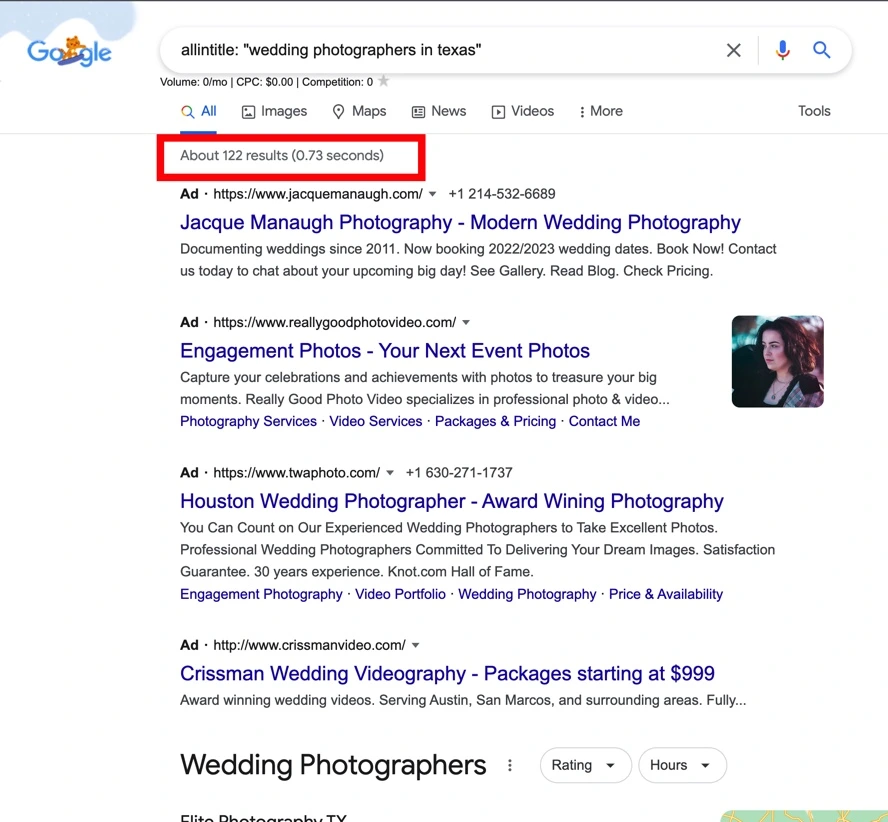
If you had the keyword in the image above on your list, from the data above, you could tell you have about 122 more websites to compete with.
Compare that with searching for just “wedding photographers in Texas,” which doesn’t give you a specific number of competing articles:
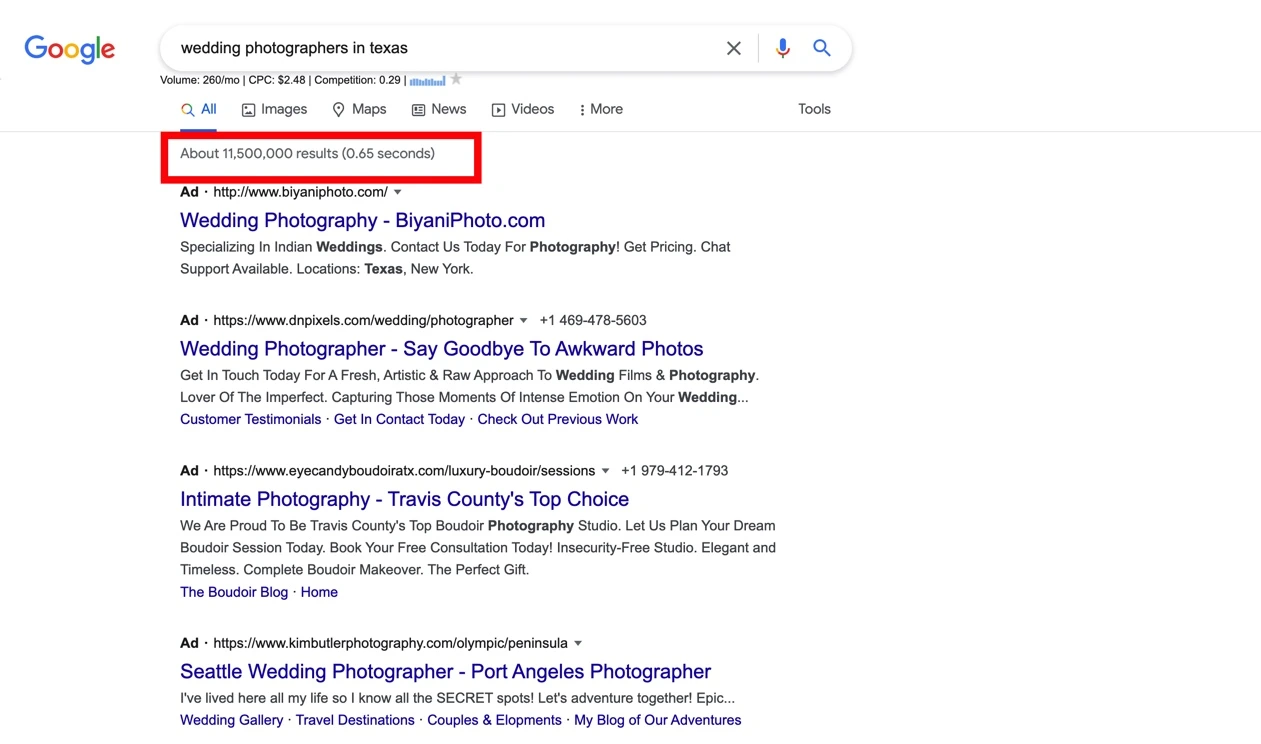
With over 11.5 million results, where do you start?
Enter Zen Matrix's four categorizing zones:
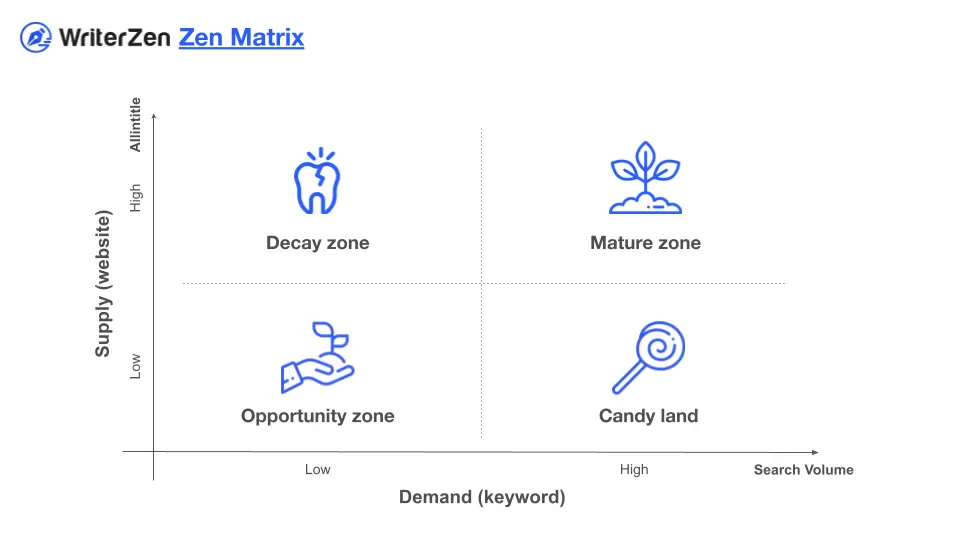
Let’s briefly look at each.
Decay Zone
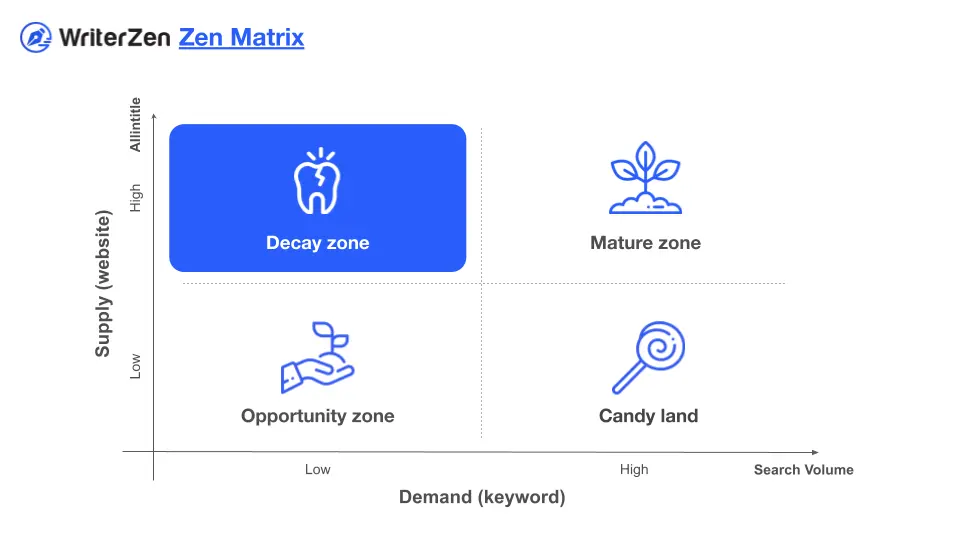
This zone comprises keywords that were once popular but no longer are. These keywords once had high search volumes, but after a while, their demand dwindled.
Or, as the name implies, they decay and lose their potency.
Keywords in this zone are related to trends.
Take “PS5 2020,” for instance.
In 2020, this keyword raked in traffic. It was hot then. You could craft content with commercial search intent and get assured of some traffic. But in 2022, it’s no longer relevant, except to someone who prefers using an old invention to a new one.
Avoid this zone at all costs.
You may rank for the queries but get little or no meaningful visits in return.
Mature Zone
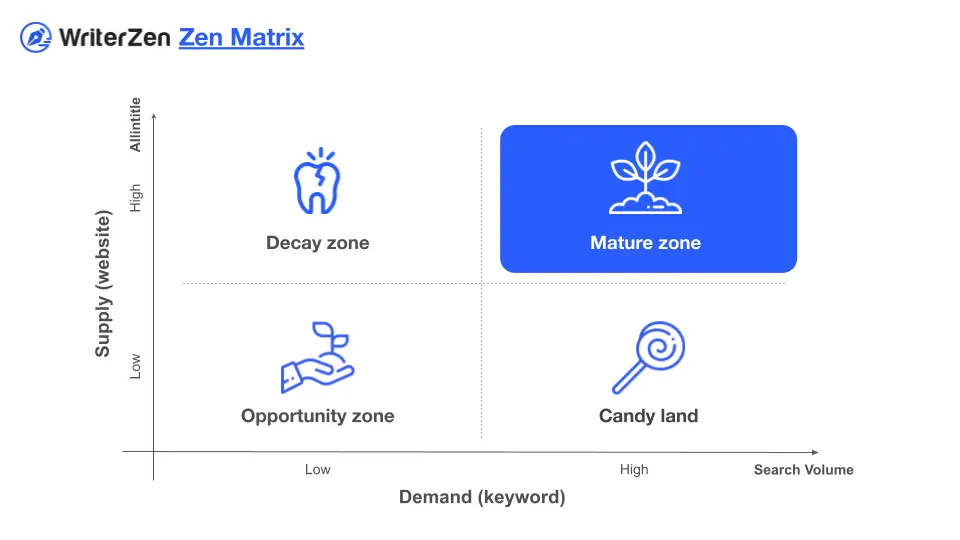
These are keywords high in allintitle and demand.
They have high search volumes, and the number of websites contesting for them is also high.
You can invest in high-quality content and target these keywords. Google expects you to do so to show how knowledgeable you are about the topic.
Furthermore, content targeting these keywords will work as an anchor for other keywords to rank as you establish your domain authority over time.
However, don’t expect to rank quickly for them because they’re super competitive.
But there’s another angle to the mature zone:
Some keywords with a high allintitle here (100+) are compensated with higher search volume. This means the demand for them is high, making such keywords attractive enough to target in the medium and long term.
Unless you’re dealing with high-authority websites, avoid this zone in the beginning. But have them at the back of your mind for the future.
Opportunity Zone
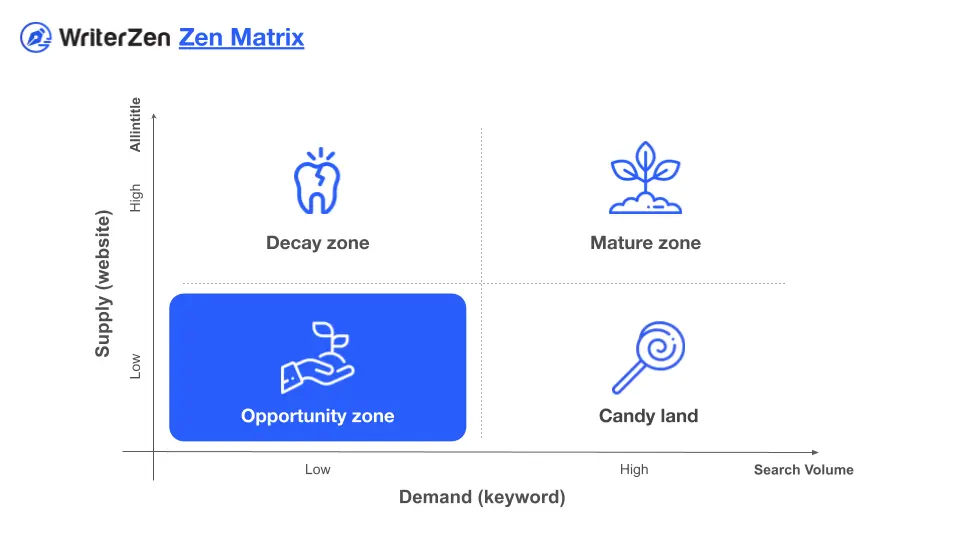
Over 15% of queries entered into the Google search box every day are new keywords. These keywords that Google recently discovered make up the opportunity zone.
The opportunity zone is a good zone to start with.
It contains rankable keywords with low allintitle and low search volume as only a few websites know about them. If you target them, you have a high chance of ranking for them in a short time.
Dana Flannery, Director and SEO Strategist at TAC Digital, testified to this:
“Some of the best converting keywords on just about every site I work on are the teeny tiny ones. There’s nothing like an epic conversion rate on targeting exactly what users want. For example, one of my clients is a psychologist. We go after a very specific topic that has 70 searches per month. It’s super easy to rank number one. While it only gets a handful of visitors per month, almost all move through the funnel.”
Target these keywords if you’re dealing with new websites. They’re suitable for a short-term SEO plan. But since the demand for them is low, don’t expect much traffic for them.
Candy Land
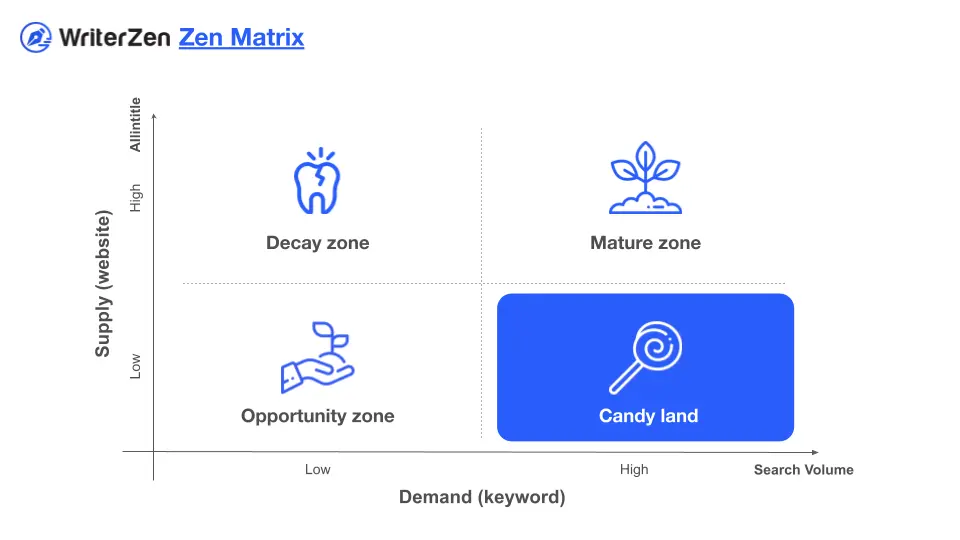
Daniel Lofaso has a name for this zone.
He calls it the “Holy Grail SEO.”
You find keywords with high search volume and low allintitle in this zone. These keywords are high in demand, but only a few websites compete for them.
If you find these keywords, go ahead and target them. You’ll not only rank for them in days. You’ll get enough traffic too.
Lofaso confirmed this:
“The ability to drive traffic to sites that are high volume and low competition is very real. It is a great strategy for startups, new websites, sites with little to no domain rating, and sites that just want to build more traffic.”
Targeting low-competition keywords in the opportunity and candy land zones should be your priority at this point. And with allintitle and other relevant data at your fingertips, this will be an easy task to smash.
But here comes a crucial question:
How do you get the allintitle and other relevant data to determine if a keyword’s competition suits your SEO campaign?
You could run keyword research in several tools then enter the keywords you deem fit into Google’s search box using the allintitle index.
Imagine doing that for 1,000 or even 10,000 keywords.
You’ll be more frustrated than Angela, our fictional character whose boss asked her to rethink her entire keyword strategy.
How about you plug your keyword into ONE tool that generates other related keywords and the allintitle for each of them?
Doing this will save you from switching tabs.
It’ll also ease your research process as you’ll see at a glance the keywords to add to your SEO campaign and the ones to dump.
WriterZen’s simplified content workflow is that tool.
To see how it works, let’s plug in the keyword “wedding photographers in Texas” into the Keyword Explorer and get its allintitle:
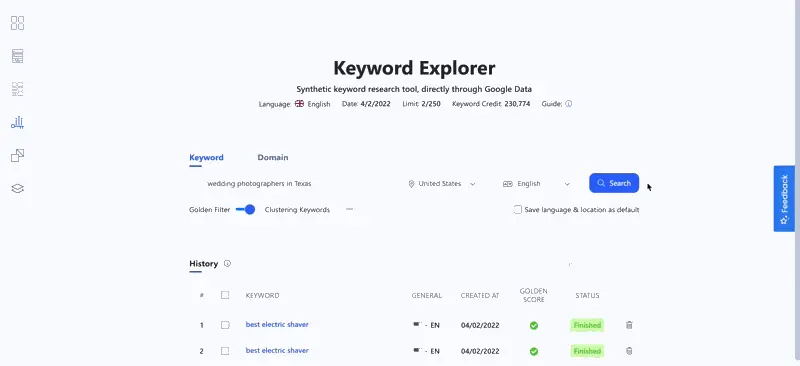 See?
See?
The allintitle, including other relevant data staring back at you in a few minutes!
This is one reason customers love WriterZen:
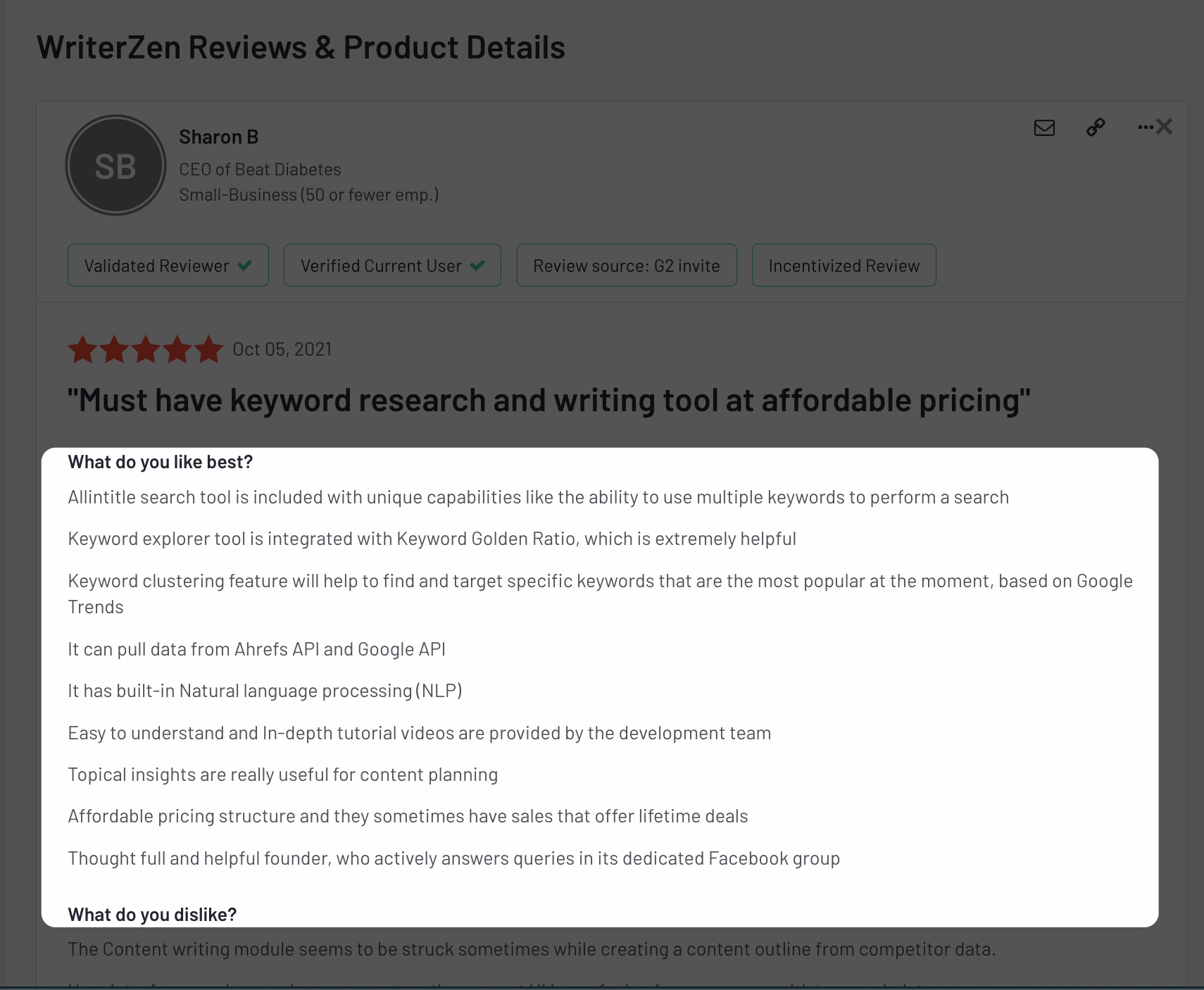
WriterZen review on G2
How to Find and Organize Keywords with an SEO Tool
Now that you know how Zen Matrix helps you categorize your keywords to suit your SEO campaign, wouldn’t you like to see it in action?
If you’d like that, here’s how to find ideal keywords in the opportunity and candy land zone with WriterZen:
Find Topic Clusters for Your Content Strategy
Before you begin keyword research, you should have a comprehensive content strategy in place. An effective one is the topic cluster approach, which gives higher rankings and organic traffic.
It involves finding and clustering relevant topics to create a pillar page (the main content for an overarching topic) and multiple sub-topics clustered around it.
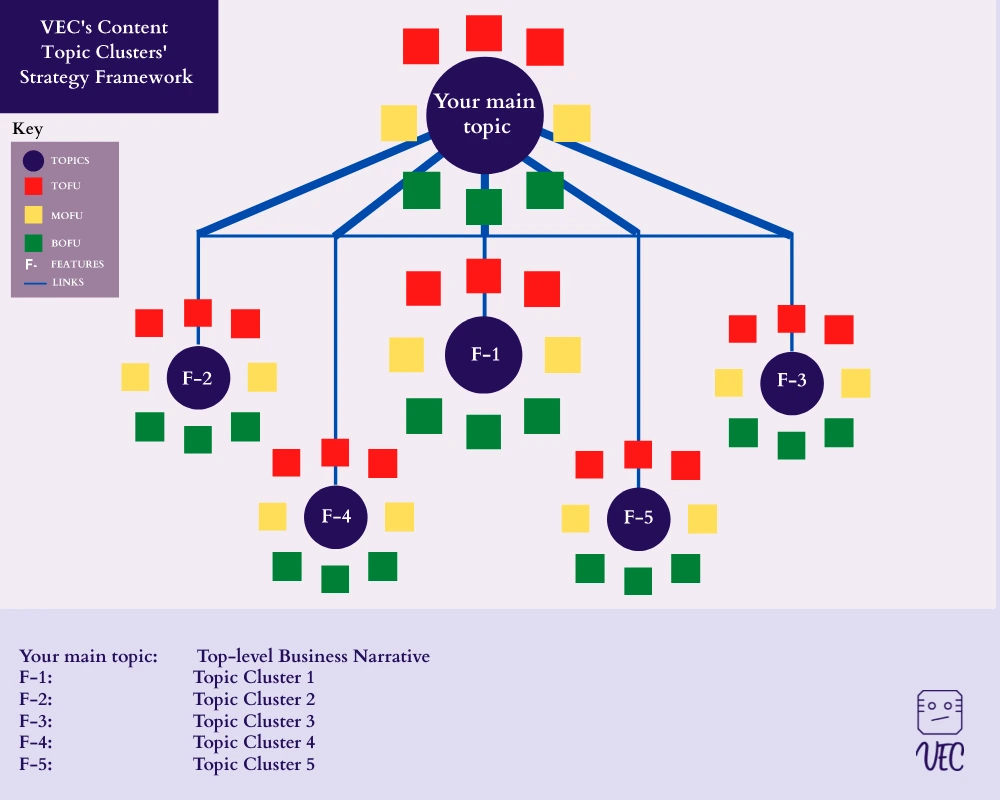
The Content Topic Clusters’ Strategy framework created by the B2B product storytelling studio, VEC
WriterZen takes the stress of hacking multiple SEO tools and sorting them manually when finding topics for your content strategy.
With one keyword, you identify relevant topics, cluster them without lifting a finger, and build your content strategy in hours, not weeks.
Our Topic Discovery tool makes all that possible.
If “content writing” were your seed keyword, type it in, and you’d get this:
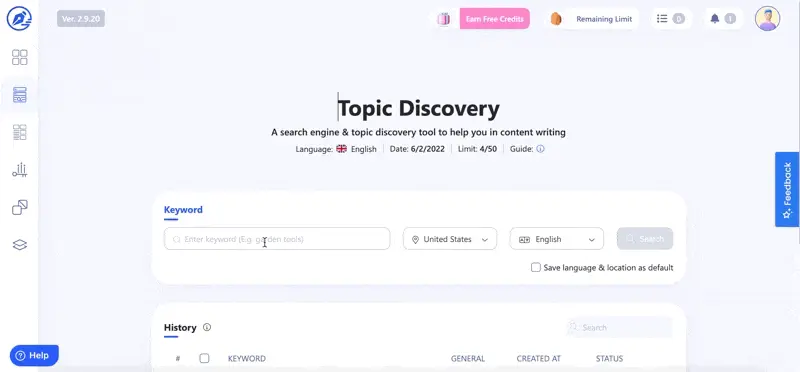
You can adjust the filter based on relevancy or search volumes to pick both topics related to your seed keyword or ones with higher searches.
After finding topics for your content strategy, proceed to the Keyword Explorer tool and…
Embark on Keyword Research the Right Way
Let’s maintain our “content writing” keyword and plug it into the Keyword Explorer:
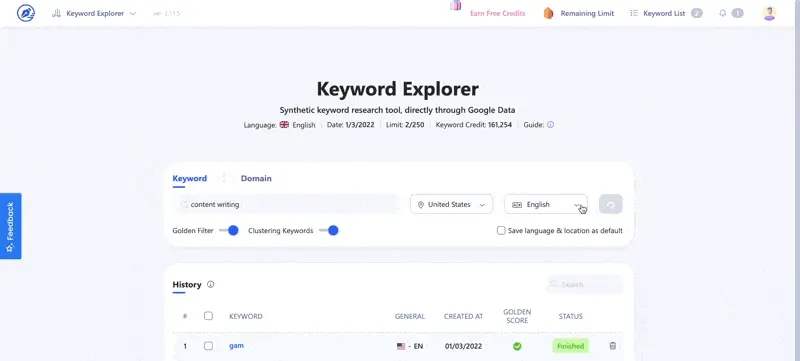
As seen above, the tool fetches other related keywords, the search volume, SERP overview, CPC, word count, keyword difficulty, keyword clusters, and other essential search insights in a few seconds.
But that’s not all you get.
Right beside the allintitle is the Golden Filter which determines in a few minutes if a particular keyword is good enough for your SEO campaign or not. This filter fetches and weeds out keywords to fit into the different zones of Zen Matrix for your usage.
It does this based on two matrix:
- Ranking Probability: This allows you to filter up to 100 search results with a low allintitle. You can adjust the filter to get keywords with as low as ten allintitle.
Use this when dealing with low-authority websites and get high-ranking keywords to boost your organic growth:
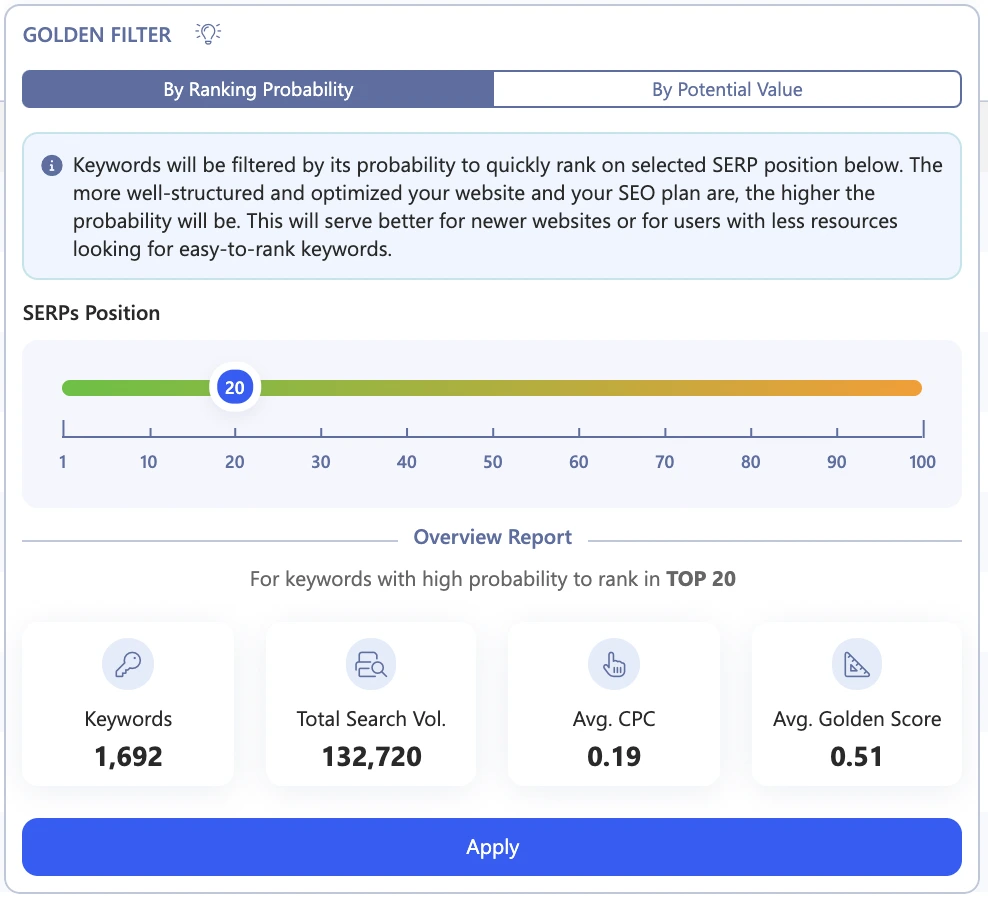
- Potential Value: This finds both keywords with low allintitle and low search volume and high allintitle and high search volume.
Use this for high-ranking websites:
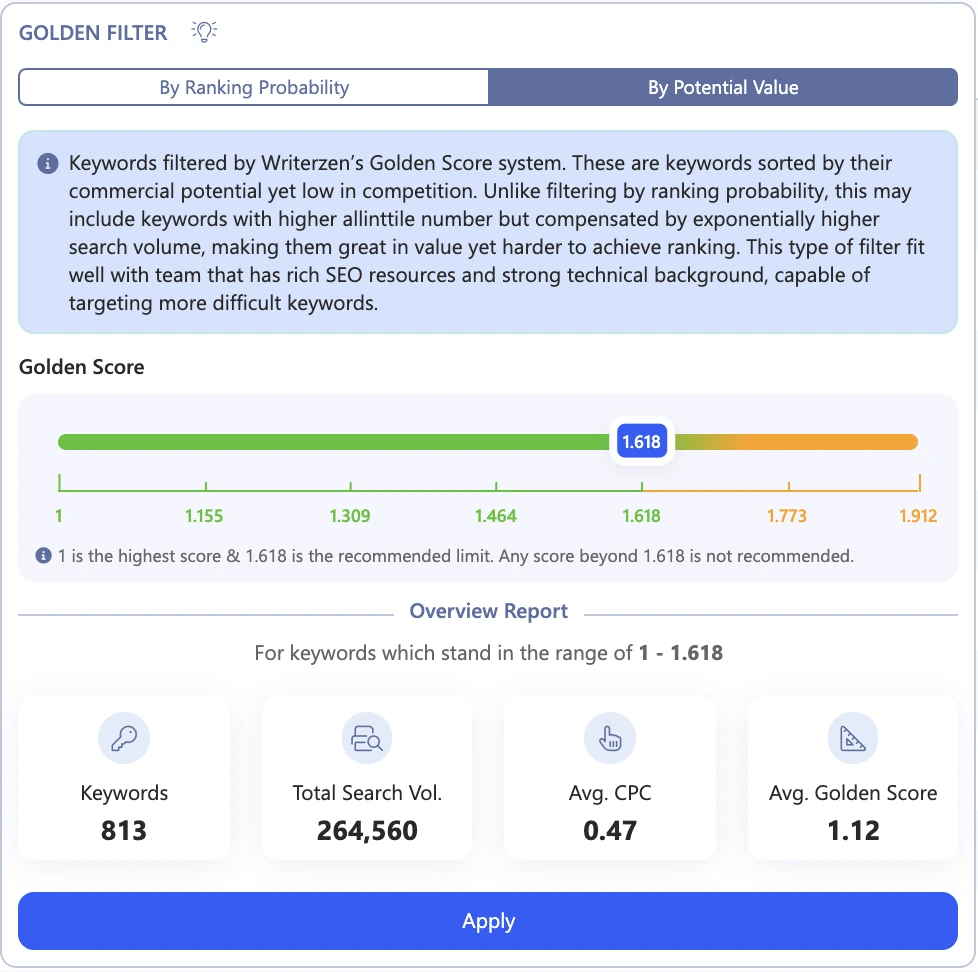 Now, let’s use the Golden Filter to find low-competition keywords in the opportunity and candy land zones to complement our seed keyword:
Now, let’s use the Golden Filter to find low-competition keywords in the opportunity and candy land zones to complement our seed keyword:
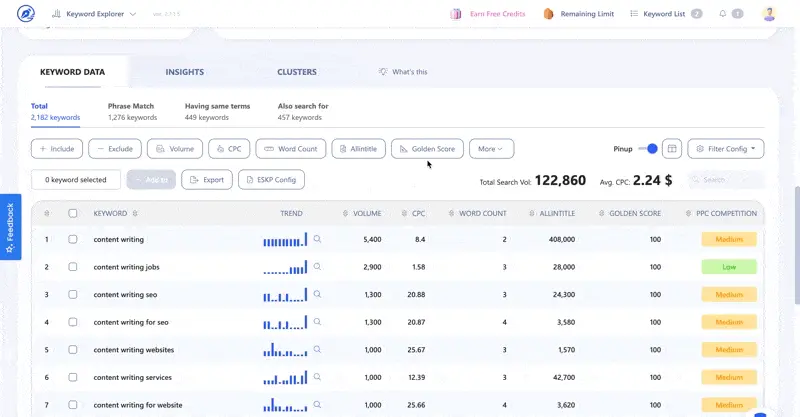
Build a List of Keywords You Plan to Target
After getting low-competition keywords you should target, it’s time to collate them.
And no.
There’s no point opening a spreadsheet on another tab. Right on WriterZen, you can add your selected keywords to a list, group, or export them once you’re done.
See for yourself:
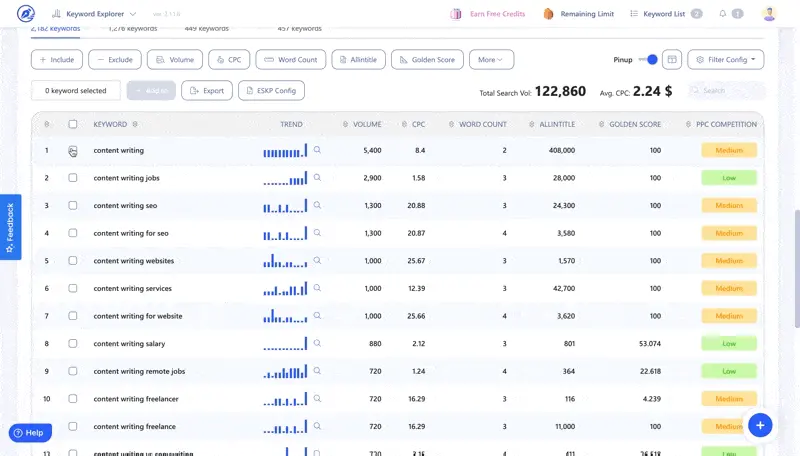
Once you’ve selected relevant keywords for one cluster, return to the topic discovery tool to get another sub-topic and research it with the keyword explorer as we did above.
We detailed how researching and categorizing keywords with Zen Matrix work in a webinar.
If you’re ready to give it a shot, watch here:
Categorize Your Keywords to Suit Your SEO Campaign with Zen Matrix
8.5 billion searches go up on Google per day.
Imagine you missed out on this because you targeted the wrong keywords that failed to improve your SEO.
Would that speak well of you as a content manager? You know the answer.
So quit spending time on high-competition keywords that only thwart your effort. Stop drowning in an overwhelming sea of keyword data you’re struggling to understand.
Turn to Zen Matrix, which is the key for you to see how to do SEO keyword research for your SEO campaign. Not only research keywords, but you're also assisted with categorizing and organizing them.
And when it’s time to craft them into high-quality ranking content users read, love, and share, know for sure WriterZen has got your back.
How?
Our customers' reviews say it all:
